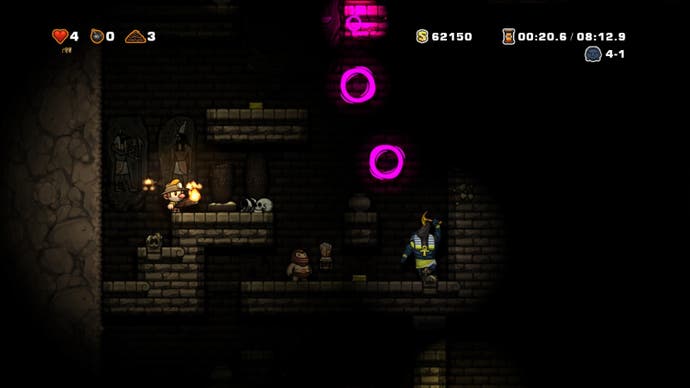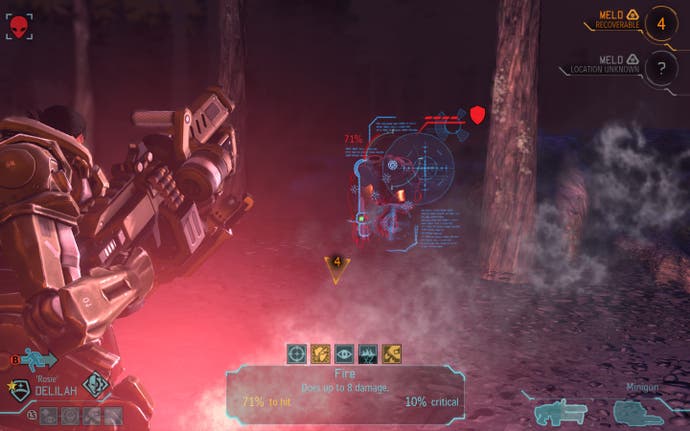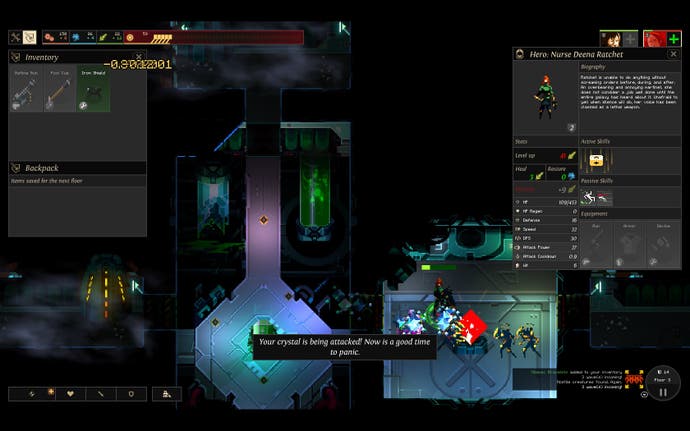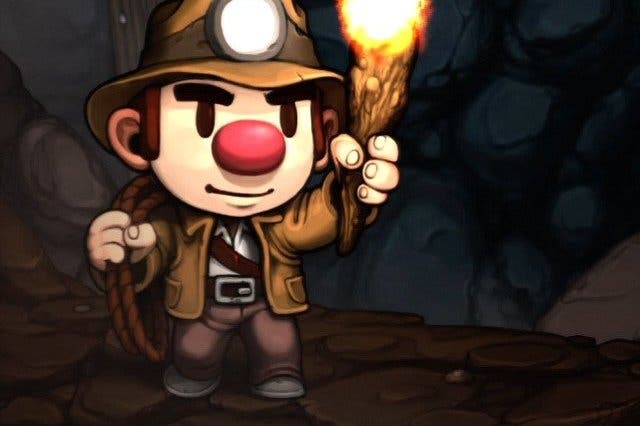Catastrophe games: How Spelunky and XCOM helped prepare me for an incurable illness
We will be in touch, Commander.
It was late this March that I decided I had become a castaway - washed up somewhere strange and frightening, separated from everyone that I knew. In truth, maybe it's more of a trajectory thing: it was in March that I realised I was on a different course to my friends and family, and that my arc might meet the horizon at a different point.
No, I'm sticking with the desert island analogy. It doesn't work quite the way I want it to - I'm not actually alone, and in most meaningful senses I probably feel more connected to the people around me than I ever have before - but it's the desert island that stuck back then, in the muddled weeks where I needed a friendly analogy more than I needed anything else in the world. Back then it was a relief to see myself, ragged but not particularly mournful, picking around the intricacies of my new home down by the slick black rocks and the whispering shores. A castaway is also a survivor, remember, and besides: this does feel like exploration, what's happened to me and what continues to happen. Does it really matter if the imagery is a little confused? These days I'm often a little confused. And confusion isn't so bad, anyway. It isn't terminal.
March was when some of the deeper confusion started to clear, in fact. For two months I had woken up to strange new symptoms every morning: tingling fingers, tingling toes, an amusingly persistent stutter. In February, a glittering chill set in below my mouth and rose, for a few days, up my left cheek before looping over my eye. It wasn't unpleasant: it felt a bit like Christmas. But it was Christmas in my face.
By late March, though, I had a neurologist and he had a theory. My immune system, which for 36 good years had done its job with sanity and restraint, attacking infections and prioritising threats, had decided to turn on me, blitzing some of the nerves in my brain and spinal cord and damaging the fatty coating that both protects them and enhances neurotransmission. Signals were getting weakened or blocked as they attempted to complete vital journeys, and the rest of me was left trying to make do as best it could. When I'm being dramatic, I say that it feels like the bridge between my brain and my body is starting to crumble - that this desert island I'm on was once part of the mainland. But I genuinely don't feel dramatic very much any more. When I'm feeling particularly sane, I remember that there's a name for what I have, and you've probably heard of it. I had heard of it: multiple sclerosis. I have multiple sclerosis.

I was officially diagnosed in September. I would prefer not to go into the details, and I don't think I really need to. The only thing I should explain is that multiple sclerosis is a fiercely unpredictable disease. It's different for everyone who has it. Sometimes it's gentle, sometimes it's vicious. Often it's both. Why shouldn't it be? My crazy immune system can strike anywhere it finds nerves, and those nerves can, in turn, affect pretty much anything in the rest of my body. I've had a very, very good run of it so far and I feel extremely lucky. Even so I've been turned into a temporary mute for a week or two, I've sometimes found myself comprehensively confused by simple things like phone messages or an unexpected turn of phrase in a conversation, and I've had to adapt to sudden riptides of fatigue or forgetfulness. Small change. Some people are paralysed. Some go blind. Often it doesn't last, but it does still stick with you, this sense that everything could drop away at any moment. How could it not?
It's frightening to live in the middle of an unfolding disaster. What's more frightening is just how unprepared I was for any of this. Before this year, I had absolutely no tangible problems to speak of, and yet I led a life of near constant anxiety regardless. My super power was a morbid fascination with the long game - an effortless skill at turning small practical upsets into really gigantic theoretical ones. There's a name for this, too, I gather: catastrophizing. And yet! And yet - in the face of an unavoidable catastrophe I've ultimately been surprised by myself. I've been surprised by the optimism I feel every day, and by the ways of coping I didn't even realise I knew. I've been allowed to preserve my identity in the face of a degenerative illness. It's only been a few months so far, but I feel grateful nonetheless.
And it's made me wonder. Where did I pick some of this stuff up?
Over the years, I've grown tired of games you can't lose. I appreciate the artistry, the scripting, the set-pieces, but I no longer feel the need to reach for the pad when it's so clear that the celebrations have already been planned and my triumph is already assured. You can't lose an Uncharted campaign or a Call of Duty campaign, say, because their spectacle fundamentally requires that the whole thing is rigged in your favour from the start. You can merely play these games so skill-lessly that you make a mockery of success - which I always do. Victory is inevitable, and therefore it's quietly worthless. You don't fail most cinematic action games in the traditional sense. Instead, you often abandon them, and that's a far bleaker kind of fate.
I reckon Uncharted and Call of Duty are chasing the wrong dragons anyway. The thing these games don't understand is that victory isn't as interesting as failure in the first place, because victory is almost always the same. Failure, though? Failure has texture. Failure has depth. There is no life without death - that's Saul Bellow speaking, although what he actually said was that death is the dark backing a mirror needs if we are to see anything. By turn, there is no true victory without the prospect of really piling yourself headfirst into a tree while everyone laughs at you. Failure's not quite the same as death, in other words: failure's where you learn to live.
Spelunky, XCOM: these, then, are my catastrophe games. And, unsurprisingly, they're games that have a special talent for failure. Or rather, they're games that are committed to turning failure into something meaningful and enjoyable - something that I've actually learned useful stuff from over the years. One of the weird things I've discovered of late is that video games can have values. Weirder yet, in the right cases, their values can become your values. Their values can help. Spelunky and XCOM - along with FTL, Don't Starve, Dungeon of the Endless - are the games that have primed me for this period of my life, the games that have allowed me, in certain small ways, to make sense of my new situation. And these are games united by one single thing: they don't grind to a halt when things go wrong. They don't opt for the easy restart when the world threatens to fall apart. Their response to catastrophe is precisely what I want my response to catastrophe to be. They get even better.

Take Spelunky. Spelunky's a game about exploring a mysterious cave network in search of glittering treasure as you fend off a pulpy variety of threats. It's a game about running and jumping and being the worst thing that ever happened to a yeti. Pitched like this, it's almost a classic power fantasy; you can see why you might want to escape into something like this when your neural wiring starts to spark and shudder.
In truth though, the fantasy doesn't help, because not even the lowly spelunker believes in that part. Instead, Spelunky's been such a valuable companion to me due to the moments where I've comprehensively blown it down there in the trembling caves, and have had to continue regardless. This is a good game when you're stocked up on health and resources, but it's a truly great one when you've used your bombs and your ropes and chewed through most of your hearts. This is when you genuinely engage with the fiction, when you lean into the screen and see what you can make of a bad situation. This is when you put the mistakes and disappointments of the past behind you, and file away any ambitions for the future. This is where you embrace life lived in the moment.
And it turns out that life lived in the moment is amazing. With my form of multiple sclerosis, I quickly started to realise that while the disease would likely never kill me by itself, the sheer weight of time could still do some serious damage. You know. All the wonderful things I should have done before. All the terrible things that might now happen. Playing Spelunky's genuinely refreshing in this regard: it's a reminder that the only moment that really matters is the moment that's currently unfolding. Strategy dries up and blows away in the present, and in its place you're left with tactics, with what to do for the next thirty seconds. Forget the City of Gold - how do I handle this frog that's blocking the exit? Forget my plans for the afternoon, what's with this stutter?
As is the case with Spelunky, multiple sclerosis has me making a lot of quick lists. I take a lot of speedy inventories and click through a lot of back-of-the-napkin calculations. With two bombs left and no ropes, I'd better not create any holes I can't get out of. With word blindness and a tingling face, I should probably avoid complex arguments with very clever people. Peace comes dropping slow, as the poet says - I can no longer remember which one, inevitably - but a little Spelunky maths helps to speed life along anyway. It works now when things aren't that bad - and I'm determined to try and make it work if things ever get worse.
If. That's the other thing about my catastrophe games: they make you more comfortable relying on luck, on uncertainty, on the hated - and beloved - random number game. XCOM's a case in point. You're leading a futuristic army against a gaggle of invading aliens, and from this top-down perspective, everything's ultimately under your control. You decide which missions to accept. You decide how to build your base to get the most juice from power generators and the best coverage from the satellites you launch. You choose which of your troops to trick out with mech suits and which to augment with gene mods. Even the battles are clockwork affairs: in this turn-based world, nobody so much as moves until you let them.
There are moments where the clockwork skips, though, and these are, again, the very moments where the game explodes into pure glory. Sure, you can surround an enemy with your best troops, you can be clever with cover, and you can send your guys into battle with the sweetest reverse-engineered alien tech. But each shot that gets fired is still down to a dice roll. Ultimately, all of your deadliest toys are just beads rattling around on a necklace, and luck is the thread that passes through their hearts.

And that's the point, I think - or at least it's the message I've taken away. I can either come to live with the role that luck plays in the panoramic sweep of life, or I can get frustrated and angry. I'm sure, over the decades ahead, there will be plenty of times for both frustration and anger, but like multiple sclerosis - and like any illness, I suspect - my catastrophe games aren't about just accepting powerlessness and a loss of control, but about getting some small degree of understanding when it comes to the various situations you might find yourself in, and working out how to make the best of them. They're about the Key Run in Spelunky, an optional task where you take an object from the game's opening levels and lug it all the way to the closing levels, just because someone asks you to. The Key Run's hard. You're not really expected to pull this sort of thing off, even before the procedural tumblers have started to turn. You'll do it anyway, though, because Spelunky's ultimately teaching you to embrace what a friend of mine, named Barack Obama, likes to call the audacity of hope.
No, I'm not going to pretend for a minute that any of this isn't entirely obvious, and if I'm getting to the point where I'm quoting politicians, I probably lapsed into sticky cliché a long time ago. But for me, 2014 has been about the transition from intellectually understanding something to comprehending it in a way that I can actually use. I've been told to set my worries aside and just live in the moment for so many years, and it's only now, when I actually have to, that I find I'm able to.
And no, I'm not going to pretend that video games have saved me over the course of this year. My family and friends and the NHS have done that. My neurologist did that when he turned my shaking hands and burning fingers into something that looked like a diagnosis. My dad did that, when he transformed all of Haywards Heath into a one-way system to get lost within minutes before a crucial hospital appointment and then got us stuck behind a digger on the way home. My wife does that. My daughter does that every morning when she leaps on my head to wake me up, reminding me that she doesn't think of me any differently now than she did before, and that I am still but a humble vehicle through which breakfast is delivered.
These games, though, did something else. Over the last few months, I've discovered that they've prepared me, in tiny, often invisible ways, for some of the lessons of this year and offered glimpses of what I might encounter when things fell apart. They haven't helped me with multiple sclerosis. In their pulpy, nutty ways, they've helped me explore different responses to difficult situations - and that's helped me with everything.
Now I'm here, almost twelve months on, and still trying to make sense of things. And games are still offering fresh perspectives. Not just Spelunky and XCOM either. One memory I can't stop turning over is a game - of sorts - that I encountered at the Barbican a few months ago, in the days when my hands were buzzing and my limbs were tingling and I was starting to allow for the idea that my immune system might be trying to unstitch me.
The game was Chris Milk's The Treachery of Sanctuary, a Kinect-powered installation in which you face your own shadow on a bright white wall, and then watch as birds rush down from the sky to pull you to pieces.
It was dark in the room where The Treachery of Sanctuary was set up, and in the muttering shadows it was very easy for me to feel that I was the only person who grasped the deeper significance of what I was witnessing, the only person who might understand that a human being could be taken apart by the unlikeliest of things. Thinking back to that moment, though, to the rough forms of the strangers around me, it's so clear that I wasn't alone in the slightest. Everybody understood what was going on, just as so many people I know have gotten in contact in the last few months with notes and stories of their own lives and their own struggles when they found out what has happened to me.
And so. It's the final stage of the jungle level and the air is starting to get chilly. I've got one bomb and three ropes and two hearts and not much else. I suspect that's enough. Oh, and I can see jewels glittering beyond a distant spike trap. I don't need them, exactly, but still...
If you have recently been diagnosed with multiple sclerosis, this link may really help. Equally, if you want to learn more about anxiety and how to start tackling it, this was very useful to me.

